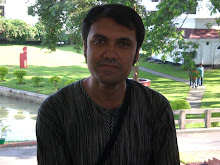
INTERVIEW
Freedom fighters won the war, not otherwise: Jacob
Omi Rahman Pial
bdnews24.com Senior Correspondent
Dhaka, March 28 (bdnews24.com)— Former Indian army officer JFR Jacob, who had designed the capture of
"I've always said it was your (Bangalees) liberation war. It was your war of independence, not otherwise," retired Lt Gen Jacob told reporters at the Indian High Commission Friday.
Jacob revisited the Liberation War history framed with a click and a flash—the bloodied birth of a nation:
On the afternoon of
In the photograph, almost all the key players were present, one of them leaning from the left of the table as if to see whether Niazi was signing correctly. And he had every right to do so. Jacob made it happen.
The
Thirty-seven years on, the general is again in the land where the great triumph was achieved. Upon invitation by the government, Jacob led an 11- member team of Indian army war veterans of 1971 to the 37th anniversary of Independence Day.
Immersed in nostalgia, a good-humoured Jacob claimed himself to be a journalist and urged the "brethren" to be kind to him with questions that would be possible for him to answer. There were a few that he dodged, but obliged to set the record straight about some issues exploited with 'evil intentions' by some quarters.
It was not a formal press conference, and the bdnews24.com correspondent took the opportunity to capture the rare moments of revisiting the Liberation War history by Jacob, author of "Surrender at Dacca: Birth of a Nation".
You had fought in
Jacob: The atrocities committed by the
How did the Indian army get involved in
Jacob: You want the official version or the unofficial one (laughs)? After the Operation Searchlight that took place on the 26th of March, the crackdown, we were monitoring the situation and were shocked to hear radio conversations of the
Last year, in an interview you claimed that capturing
Jacob: Well, it's a long story and you'll get tired of listening to it. The details are all written in my book, how everything happened and when. It's a very comprehensive documentation of the strategy and tactics used. I ask you to have a look at it.
Is it true that the freedom fighters were trained in
Jacob: No, not before the war. To be precise, it was from the 13th April that we started helping them and it was a continuous process.
How did you guess that the surrender was on the cards?
Jacob: On the 14th December, we intercepted that a meeting was to be held at the Governor's House. Assuming that Niazi would be there with the governor, we planned an air strike. After it was carried out, the governor resigned. He took refuge in the Intercontinental Hotel. The situation was critical as the UN had the Polish resolution in their hand, the Russians telling us to hurry up as they were worried about the overuse of the veto power in our favour.
That afternoon, General Niazi sent a ceasefire proposal to the UN. Bhutto was in
You had drafted the instrument of surrender. What was Niazi's reaction when you placed it before him?
Jacob: He (Niazi) said, 'Who told you that we want to surrender? You are supposed to talk about ceasefire.' Then, the argument went on and on. Then it got stuck with regard to surrendering to the joint forces. He insisted it was to be the Indians. And I refused and insisted that it was going to be both
Then, I gave him 30 minutes to think it out. When I came back, he still kept quiet. Then I walked up to him and said, 'General do you accept this document?' I asked him thrice, but he didn't answer. So I picked it up and said I'd take it as accepted.
Then I saw tears in his eyes. I looked at him with pity and thought this man has behaved very badly with the people of
He (Niazi) said, 'I won't surrender anywhere else. I'll surrender in the
I said no. You will surrender at the racecourse in front the people of
It's the only public surrender in history.
Niazi said: 'You'll also provide a guard of honour.'
It was he who had said
Why was the commander-in-chief of
Jacob: There is a lot of propaganda about it. The fact is, he was in Sylhet. He was in a helicopter that was shot at by the
Afterwards, you had the chance to interrogate Niazi and Major General Rao Farman Ali (a key player in the 1971 crisis and adviser to the governor of
Jacob: They denied everything, the atrocity and everything. They kept on saying that they would not forget the humiliation and would take 'badla' (revenge).
The 1971 war is often referred to in different quarters as another Indo-Pak war and some say it was a civil war, and these words hurt our pride. What's your view on it?
Jacob: I've always said it was your liberation war. It was your war of independence, not otherwise.
The call for trying collaborators, the local war criminals, is heating up as sector commanders have launched a broader movement. Should
Jacob: It's the internal matter of the government of
Last of all, I want to tell you something. The freedom fighters and the East Bengal Regiment, who with their limited resources fought a mighty regular army, earned the liberation of
We helped them, we were brothers in arms. But it was their fight, they fought it. They fought with passion and they achieved what they fought for. I give my heartiest blessings and share the pride for them. They are the gems your country should be proud of.
bdnews24.com.

No comments:
Post a Comment